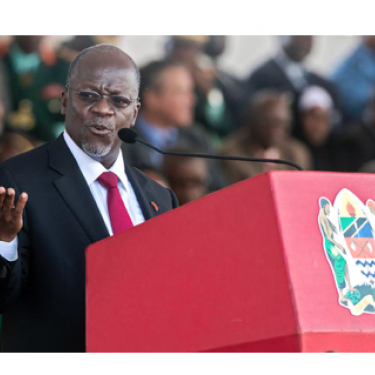Brazen interference in the media by Tanzania’s government

Reporters Without Borders (RSF) is very disturbed by Tanzanian President John Magufuli’s declaration of support for Dar es Salaam governor Paul Makonda’s heavy-handed raid on a radio and TV station last week, and urges the authorities to leave the media alone and to stop interfering in their work.
There has been an outcry in Tanzania about the way Makonda stormed into Clouds FM on 17 March accompanied by armed police officers, who ordered the station’s staff to broadcast a video incriminating Josephat Gwajima, a Protestant church leader and well-known opponent of the governor.
Makonda has tried to discredit Gwajima by accusing him of being involved in drug trafficking but has failed to produce convincing evidence. Clouds FM’s employees refused to broadcast the video because of the nature of its content.
Far from condemning the governor’s behaviour, President Magufuli endorsed it during the comments he made at the inauguration of a construction project in Dar es Salaam. “I, as president, don't let anyone tell me what to do,” he said. “I decide who should be where. So you Makonda, do your job and ignore the rest."
Reporters Without Borders has also learned that information minister Nape Nnauye, who visited Clouds FM afterwards and announced that the incident would be investigated, has just been fired without any explanation.
“We are witnessing a grave and unprecedented interference in the media by the executive,” said Cléa Kahn-Sriber, the head of RSF’s Africa desk. “These recent events show how brazen the government has become in its attacks on media freedom.
“President Magufuli says he wants to combat corruption and establish the rule of law, but that cannot happen if the law is not respected. This kind of arbitrary attitude runs totally counter to the rule of law. We call on the Tanzanian authorities to end the repeated attacks on the media and to respect freedom of information.”
Dubbed “Tingatinga” (which means “bulldozer” in Swahili), Magufuli has declared a crusade against corruption but his summary methods have received a great deal of criticism, which he has taken badly.
He has attacked media freedom ever since taking office in November 2015. Several radio stations were shut down in the space of a few months and at least ten people have been prosecuted over their posts on social networks.
Journalists have told RSF they are no longer free to criticize the president and his associates. If they do, retaliation is swift and can range from a threatening phone call to prosecution.
Maxence Melo, the founder of JamiiForums, East Africa’s leading website for whistleblowers, is being prosecuted for refusing to reveal the identity of contributors who have help to reveal cases of corruption involving major privately-owned companies that support the government.
The Media Services Act that President Magufuli signed into law last November, replacing the Newspaper Act, which dated back to the 1970s, has been much criticized by media organizations and the Media Council of Tanzania, which deplored the failure to take its recommendations into account.
This new law provides for heavy prison sentences and fines, and restricts the freedom of journalists by requiring that they be officially registered and by allowing more control of content. It also requires all social media users and contributors to be accredited.
Tanzania is ranked 71st out of 180 countries in RSF’s 2016 World Press Freedom Index.



